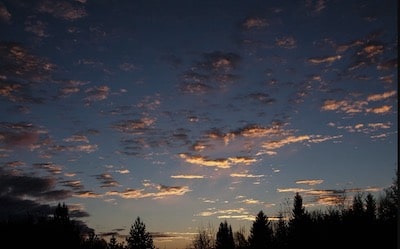 Lost in the murk of pandemic this April is our annual Earth Day. It shouldn’t be. The health crisis is the new baseline for discussion of almost everything, including environmental issues, and by extension, writing about environment. We all want COVID-19 to just go away and stop killing and let us get back to the business of living.
Lost in the murk of pandemic this April is our annual Earth Day. It shouldn’t be. The health crisis is the new baseline for discussion of almost everything, including environmental issues, and by extension, writing about environment. We all want COVID-19 to just go away and stop killing and let us get back to the business of living.
Yet a captivating side effect of the virus has arisen. Earth, it seems, has gotten a chance to draw a breath. In Venice, Italy, the water of the canals has suddenly become clear. In Los Angeles, the eye-stinging smog that hugs the city has largely vanished, and blue skies are dazzling longtime residents. “Insanely clear” is how one writer describes it. In Jalandhar, India, people are gazing in awe from rooftops at the snowy Himalayas, more than a hundred miles away, the peaks towering over the landscape, clearly visible for the first time in many years. Even here in Florida, a peninsula blessed with good air, courtesy of sea breezes from two coasts, the skies are noticeably clearer. Take a moment and see.
It’s not all about pretty views. Because COVID-19 attacks us our respiratory systems, it should surprise no one that a recent study found that cities with higher levels of air pollution were experiencing higher mortality rates due to the virus.
When I go out on an evening walk in our neighborhood, I now see more families out walking and cycling than I’ve seen in the twenty years we’ve lived here. And they’re having fun, all while being careful to maintain social distance.
Writers have an opportunity—and a responsibility—to do more than entertain. We write to make things better. The good news is, entertaining and improving are not mutually exclusive.
Last month, I zeroed in on Charlotte Brontë’s Jane Eyre to discuss how that novel added to the conversation of the day about public health. Brontë focused on specifics of sanitation relating to a typhus outbreak, an environmental issue. She entertained readers with story and exquisite craft, yet moved the football a couple of yards closer to the goal line of a better world. So when we talk and write about environment, the basic discussion, the point of it all, is to work towards ensuring one in which we thrive safely and in good health, and practice good stewardship for Earth’s other species as well.
Most of us will spend Earth Day quarantined or socially-distanced. So be it. But don’t squander it. It’s not a holiday. Pick up John Muir or Henry David Thoreau or Rachel Carson and study their writing styles. If nothing else, sit in the shade of a tree and write a paragraph or a poem about the experience, the feel of the cool grass, the rustling of leaves, the dappling of light and shadow on the ground, the fractal complexities of the blue and green canopy above. Enjoy the moment. Even if it includes bugs.
With that, I’ll leave with Emily Dickinson’s “There is Another Sky”, something fitting the moment:
There is another sky,
Ever serene and fair,
And there is another sunshine,
Though it be darkness there;
Never mind faded forests, Austin,
Never mind silent fields –
Here is a little forest,
Whose leaf is ever green;
Here is a brighter garden,
Where not a frost has been;
In its unfading flowers
I hear the bright bee hum:
Prithee, my brother,
Into my garden come!

Louis Kicha
I just published a novel concerning the release of an ancient virus and bacterium from melting permafrost resulting from climate change. Been writing it for 3 years. I hate being prescient! ????
ken pelham
Louis, thanks for reading!
The scenario you envision is quite possible. Lots of things are being exposed due to the thawing of permafrost.
Shutta Crum
Thanks, Ken, for the reminder. Also I’d like to mention the wonderful nature writing of Loren Eiseley. If you haven’t read IN THE NIGHT COUNTRY you are in for a real gift. Beautiful, as are all his essays.
ken pelham
Thank you, Shutta.
I’m not familiar with that book but I’m always in the market. I appreciate the recommendation.
Niki Kantzios
Aptly put. There are all sort of issues of conscience that novels can address, but surely ecology is the Big One.
ken pelham
Thank you, Niki!
As I see it, all issues of conscience are connected at some level.
Kathy Elbert
Thank you for giving us all a chance to take a breath and read a beautiful piece about writing and the environment. And, how our writing can bring thoughtfulness and maybe, just maybe, some change for the better. Thank you, too, for sharing the beautiful poem.
ken pelham
Thanks, Kathy! Environment is a topic close to my heart and I’m always eager to discuss it.
Patricia Petronella Balinski
Ken, Thank you for the reminder of nature’s way of telling us, although without such an impact, but then maybe it was necessary for us to take stock of our environment, including our own neglect. Enjoyed your article. Stay well.
ken pelham
Thank you, Patricia! Stories of rebounding nature continue to come in. We need to take steps to hang on to this rebbound beyond the pandemic.